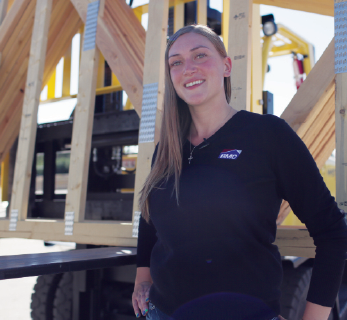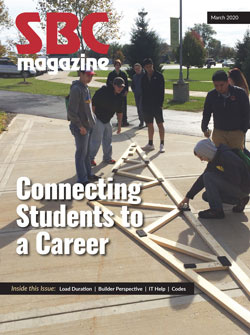Faces of the Industry: JoAnn Gidley
Faces of the Industry: JoAnn Gidley
Director of Texas Truss and Components • BMC • Conroe, Texas
How’d you get into this industry?

My grandfather was a general contractor, and my mother is one, too. I was toted around jobsites from a young age, and today the smell of fresh cut lumber and construction dust still brings me back to the good ol’ days. After graduation, I followed my heart and pursued a career involving animals. I found I loved animals more than I loved the career. A friend pointed me to a job opening at BMC, and I succumbed to the call of the lumber yard.
From there, I grew into many roles. The downturn of 2008 pushed me to learn and perform multiple jobs. Flexibility was the key during those challenging times. Accepting those challenges and learning to excel during periods of large scale change were ultimately what led me to the management track and truss facilities. Upper management recognized my work ethic and drive to get the job done. Under their guidance, I was able to learn more about the industry and myself. I can say I’ve been surprised more than once.
What’s your favorite part about being in this industry? What could you do without?
Easy – people, people, people. During those trying times during the recession, going to work was not always my favorite part of the day. But I was blessed with some fantastic leaders and mentors that held steady, provided encouragement (and honesty), and put aside their own worries to keep the ship afloat. I was young, impressionable, and a little needy, so I soaked it all in. We came out of what could have been a disastrous time stronger and more capable than ever. Bonding, scrapping, pulling together, building each other up, holding each other accountable, those are the keys to what keeps me in the industry. Sure, that can apply to any career, but they don’t all have lumber involved.

Now, I encourage people to take my job. Before the downturn, people were cautious to teach you much, but nothing is top secret. Much like my mentors, it’s important to give employees all of the knowledge so they are just as empowered as you are.
On the other hand, it’s frustrating to me that our industry feels so far behind in manufacturing technology. Things just seem to be slow to change and have not improved all that much in the last 13 years that I have worked in the industry. We have made some improvements, but it seems that we still have a long way to go. BMC is always looking to invest in technologies and move our industry forward, which means we may hodge-podge things together because we are growing our mechanics-oriented folks and focusing on creating hybrids of equipment. As the workforce continues to get younger and there is less understanding of the manual way of doing things, it is putting a large strain on finding individuals who want to work in our facilities.
What challenges do you see for the industry in the future? What solutions do you have for those challenges?
We need to get more user-friendly going forward, all the way from the office to delivery. If we do not push to continue driving ourselves out of the manual way of doing business, we likely will not have a business. We are working closely with production builders and trying to find out what they want to help drive business and be more customer friendly.

It is getting harder and harder to attract and retain a viable workforce. Anyone that went to school knows that money is not the key driver to employee satisfaction. Appreciation for a job well done and job security trump that. What does it say about how we care about them and their future when we ask them to drive a team of mules when their peers are driving Teslas? I see this theme repeated over and over in other manager’s challenges. My question to our industry is why are we still teaching employees to swing a hammer, when hammers should really be obsolete?
The productivity initiatives implemented over the last ten years are maximizing our employees' physical capabilities. That, along with a workforce that is not interested in physical labor, will continue to drive us to automation. It’s time to stop forcing people to work the way we used to and start focusing on what we need to do to adapt to the future workforce. This carries over into materials and processes as well. Look at the automobile industry. Forced by government sanctions and environmental concerns, they reinvented themselves and came out stronger and much more flexible in the end.
What will be our forcing function? When we start building homes on Mars, we are not going to have lumber as our go-to material or a large labor force to put it together. Wouldn’t it be great if we get in front of that and look at new materials to use? With the current movement to eliminate plastic, go green, and save the planet, the consumer is poised to move away from lumber. What if we had 3D printers that created a one-piece truss using recycled plastic? Light weight, durable, no plates or saws, and waste would become almost nonexistent. The technology is there; however, our industry focus should not be on adapting to what is available. We are the visionaries, and defining the dwelling of the future and how it is created is our greatest opportunity.
Additionally, we need to be innovative in how we create products for the builders. Thinking ahead and delivering them a product that is easy for the trades to use, or even replacing the trades with a fully produced product from the vendor is the way of the future.
I see these themes repeated over and over in my peers’ writings. We are all hungry for change. It is up to us to make it happen.
What’s your company, market, or SBCA chapter focused on right now?
I think we can all agree that the new world has little patience to wait for the old systems to catch up. I was hired in 2006, and promoted, to help bring BMC into the new age through our association with forward-thinking trade partners like SBCA, research and adoption of new and innovative tools, and a pipeline of transformational ideas from the shop floor to the customer.
When you’re not thinking about trusses, what keeps you busy?
Not thinking about trusses?! My husband, son, and I love a good road trip and exploring new areas. We are always up for adventure. Beaches, golf courses, horses, something for everyone. The weekends are typically spent with our horses, Spice and Blaze. Working with 1,200 lb. animals or even a small child, I’ve had to learn to effectively communicate without words. The secrets are leading by example, reading their cues, and connecting with body language. As I carry these lessons into my daily interactions, I find the insight to apply just the right balance of pressure and freedom to get the most out of myself and those around me.

